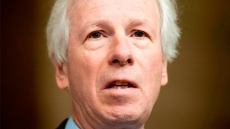CALGARY — The federal government has fleshed out how it proposes to measure upstream greenhouse gas emissions resulting from new resource projects.
Ottawa announced in January that federal project reviews will take into account the broader climate impacts of projects like pipelines and liquefied natural gas facilities.
A notice in the Canada Gazette sets out the Environment Department's proposed methodology for coming up with estimates and interested parties have 30 days to comment.
The approach is two-pronged. The first part of the analysis would measure emissions associated with producing the oil and gas that would fill pipelines or plants under review. The second part would discuss a variety of market scenarios, examining the conditions under which the emissions could occur anyway if the project weren't built.
Erin Flanagan, director of federal policy at the Pembina Institute environmental think-tank, said the government is asking the right questions and she's pleased to see emissions from gas venting and flaring taken into account.
"I think that they're getting a lot of it right," she said.
But Flanagan said she'd like more clarity about how projects reviewed under the new rules would fit into the context of Canada's current goal of reducing its emissions by 30 per cent below 2005 levels by 2030.
"Can we have the infrastructure conversation divorced from a conversation about our targets?" asked Flanagan.
Kathryn Harrison, a professor of political science at the University of British Columbia, said there are many unanswered questions that make it impossible to tell whether any given project would get the thumbs-up under the new rules.
Firstly, there is a lot of variation amongst oil and gas operators when it comes to their emissions performance.
"It's not clear how specific how those emissions factors will be to a particular operation and to a particular operator," she said.
She also wonders which production forecasts the analysis would use. If a forecast doesn't take into account what would need to happen in order to limit global warming to 2 Celsius above pre-industrial levels "then there's a hypocrisy built into the test from the get-go."
Harrison adds pipeline projects are built to operate for several decades, so it's important for the analysis to look at a long time horizon.
"The problem is we're approving projects now that will last for decades when we've only got an emissions target less than 15 years out."




